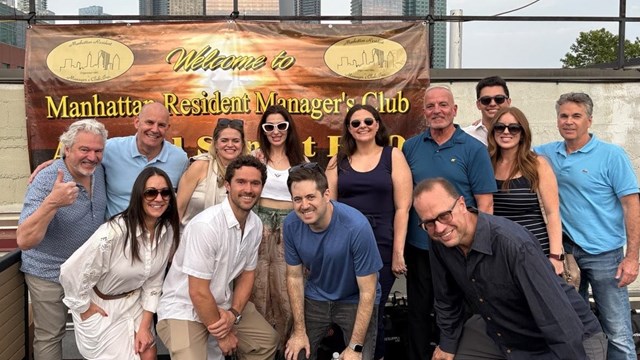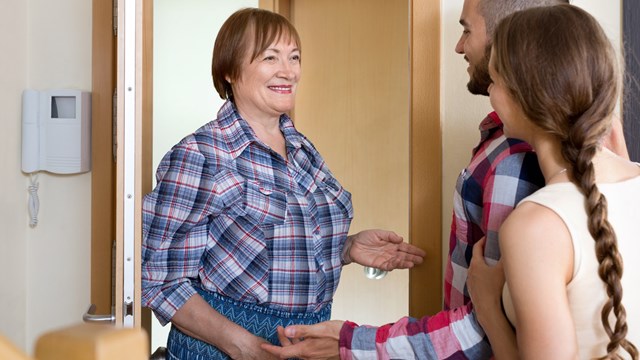
Nearly every residential building in the city has one—they’re an integral part of all your building systems, a direct line of communication between your residents, your manager, and your board. They’re on-call 24 hours a day, seven days a week. They know things nobody else knows, and can do things nobody else can do. They’re building supers, and they’re the backbone of the city’s thousands of multi-family buildings—co-ops, condos, and rentals alike.
Building supers here in New York are a breed unto themselves, and as such they have special interests, issues, and needs unlike those of building managers, groundskeepers, or janitorial staff members in other cities. To address this singular population, the Superintendents Technical Association (STA) of New York was founded in 1998.
The Mission
The STA (formerly The Supers Club of New York) has gone through a number of incarnations over the years, but from the very beginning, the fundamental purpose of the organization is service to its membership. The group’s mission statement says it aims to provide “a society for building maintenance personnel—superintendents, handymen and porters, and others—in which to share expertise, learn about new equipment and maintenance procedures, to encourage each other toward greater professionalism, and to enable [them] to have their own industry organization and publications.”
According to current STA president and professional super Peter Grech, the group also set out to encourage and help groups in other cities to replicate the efforts of the STA. In addition, according to the STA mission statement, the group is committed to expanding its philosophy “to bring dignity and respect to the building maintenance profession…and to help our members learn of the latest processes in use in our profession—especially computers and the Internet.”
Early Efforts
According to former STA secretary Dick Koral, “With significant exceptions, multifamily building management invests very little in the education and training of its workforce. Except in the case of some luxury buildings, maintenance personnel are recruited from among the least educated, least-trained sectors of the population, paid the lowest wages possible, and almost no effort is made to educate or train them [after they’re hired.] This policy may be penny-wise, but it’s pound-foolish.”
Koral says he “became acutely aware of this phenomenon” in the late 1970s when he began developing and teaching a series of courses about efficient building operation and maintenance at the New York City Technical College. Much to Koral’s chagrin, he says he was told by more than one person that trying to educate building maintenance workers was a waste of his time. The prevailing attitude at the time seemed to be that building staff members were little more than glorified janitors, and would be uninterested in what Koral was offering. Undaunted, Koral pressed on with his courses.
Far from finding the supers, porters, and other custodial workers apathetic, says Koral, “I discovered that the opposite was true. The New York supers were eager and quick learners. For the first time in their lives, someone was telling them how those boilers they had struggled with for years really worked and how to optimize their performance.”
Koral’s experiences with teaching supers more about their trade led him to consider what other types of resources New York’s building maintenance workers might find useful.
“Almost all professions, from doctors to plumbers, have their own professional societies and publications to keep members abreast of new developments,” says Koral. “Identification with these societies and publications help individuals practice their professions. Just as importantly, they bolster the individuals' sense of self worth.” Before the founding of the STA, building workers had only their union to fulfill this function. But that was about to change.
A Super Idea
In March of 1998, the founders of the STA got a grant from the New York Office of Local Initiatives Support Corporation (LISC-NY) to organize a technical society for maintenance workers. The group’s charter members included many of the building workers who had taken Koral’s classes—many of whom worked for publicly funded housing developments and stood to benefit the most from ongoing educational and advocacy programs. Within a few months, the group’s newsletter Super! was rolling off the presses, and membership was growing.
Though the group is now named the Superintendents Technical Association, membership and decision-making were not just limited to superintendents alone. When it started, the STA charged $25 dollars a year in dues for supers and maintenance directors, and $15 for handypersons and porters.
Today, the group is also open to non-voting associate members, vendors, building owners, co-op board members and managers, and other professionals—people who, in Koral’s eyes, understand the connection between well-trained, educated building maintenance staff and a well-run, well maintained building. The group is also working on plans to export the ideas and philosophies behind the STA to other communities—both urban and suburban—across the country.
The group still holds true to its core philosophy, however. According to Grech, “We keep our membership dues modest because it’s not about the money—it’s about helping people in our profession achieve more. Our goals are based on what our membership needs.”
Meetings of Minds
To meet those needs, every month, the STA’s three chapters—in Brooklyn, the Bronx, and Manhattan—meet individually to check in with members, discuss ongoing issues of importance, and listen to expert speakers brought in to talk about a wide range of subjects of interest to the city’s building maintenance workers. The Brooklyn chapter meets at 5:30 p.m. on the 4th Thursday of the month at 25 Chapel Street in Brooklyn, the Bronx chapter meets at 5:30 p.m. on the 4th Wednesday of the month at Hostos Community College in the Bronx, and the Manhattan group convenes on the 4th Tuesday of the month at the Times Square Hotel in Manhattan.
At a typical STA monthly chapter meeting, an expert speaker is invited to present on a topic chosen by the members—past speakers have covered everything from plumbing repairs to energy conservation to integrating building systems with computer software. Post-presentation, members are invited to ask questions and expand on the speaker’s seminar.
According to the STA website, “Guests are always welcome at club meetings—you do NOT have to be a member to attend, and there is no charge for attendance.”
Every year in December, the three STA chapters meet to go over association business and elect new directors to replace those whose terms are up. According to the STA’s bylaws, “A regular annual meeting of the board shall be held on the 1st Tuesday or Wednesday of December each year except that if such day be a legal holiday then in that event the directors shall fix a day not more than one week from the date fixed by these bylaws.”
Advocacy and Empowerment
While it would be presumptuous to lump all building superintendents into one group and make assumptions about their collective level of formal education or socioeconomic background, Koral says that some of the challenges facing the STA in its efforts to empower and advocate for maintenance workers hinge on exactly that. In most buildings, supers and handymen are hired more for their ability to fix a leaky pipe than their computer literacy, or even their fluency in English. Issues like language barriers and lack of access to technology—like personal computers and the Internet—have been hot topics for the STA.
“The number of members who own computers and have access to the Web is a small fraction of our total,” says Koral. “So we devote 15 minutes of every meeting to a discussion, led by our webmaster, of purchasing personal computers, various types of software, and relevant sites on the Web.”
Getting supers and maintenance workers to a place where they’re comfortable using a computer and relying upon technology to make their jobs easier is a struggle, says Koral. “So many of the supers have been told that they belong ‘downstairs’ and that computers are the world of the ‘upstairs’ directors, managers and owners,” he says. “However, the bottom line of the whole project is empowerment, for their sake and that of society.”
To further the cause of personal empowerment and address the needs of non-English speaking members, the STA began publishing a Spanish edition of Super!, and distributes over 800 free copies of both editions every month. The group offers members a wide array of educational opportunities as well.
“We offer lectures, workshops, and seminars dealing with anything and everything a super may need to know,” says Grech. “We touch on the basics like fixing toilets, but try to stay current as well—so we include lectures on building codes and violations, both at the city and state level. Many of these sessions are also presented in both English and Spanish.”
The STA also maintains an exhaustive website at www.nycsta.org, which not only has a wealth of information about the organization itself, but maintenance-related book reviews, glossaries, maintenance FAQs, news, links to other helpful sites, a list of useful phone numbers, and employment boards for both employers and job-seekers. The site also features the Tip of the Week, which could be anything from how to loosen vinyl floor tile adhesive (use an electric heating pad) to how to get dents out of lobby furniture (put a drop of water in the dent and apply a hot iron—the steam pops the dent out).
“Maintaining a useful and functional website is a current and ongoing goal,” says Grech. “Particularly the ‘frequently-asked questions’ portion. We’ve got 618 questions archived on the site, and we have our newsletter archived there as well.
Into the Future
The STA’s goals and programming don’t just stop with enriching members’ understanding of their job and giving them a forum to voice concerns and ideas. “Another goal of ours is to continue finding jobs for our members,” says Grech. “Not just for supers, but for porters, doormen, and maintenance people as well.”
“Perhaps the most important long-term goal is to secure some kind of certification for supers,” Grech continues. “We hope to someday sit down with the Department of Housing Preservation and Development (HPD) and hash that out. Certification would insure that buildings hiring new supers could be certain that the candidate has achieved a certain level of training and education.”
And in amongst all of those activities, the STA is also reaching out beyond its membership to raise awareness of the group’s existence and philosophy.
“We have a partnership with NYSERDA’s Partnership to Rebuild America,” says Grech, “and we do other volunteer work—for example, we recently donated time to a church in Long Island to help them do some renovations and put up sheetrock in their basement. We also participate in trade shows and do lectures for co-op and condo boards.”
In a few short years, thanks to a lot of effort and motivation, the Superintendents Technical Association has grown from a small group of professionals looking to learn more about their job to a city-wide network that includes some of the most important people in the residential housing industry. Supers really are the glue that holds our buildings together, and thanks to the work of the STA, that glue is stronger than ever.
David Garry is a freelance writer living in New York City.





Leave a Comment